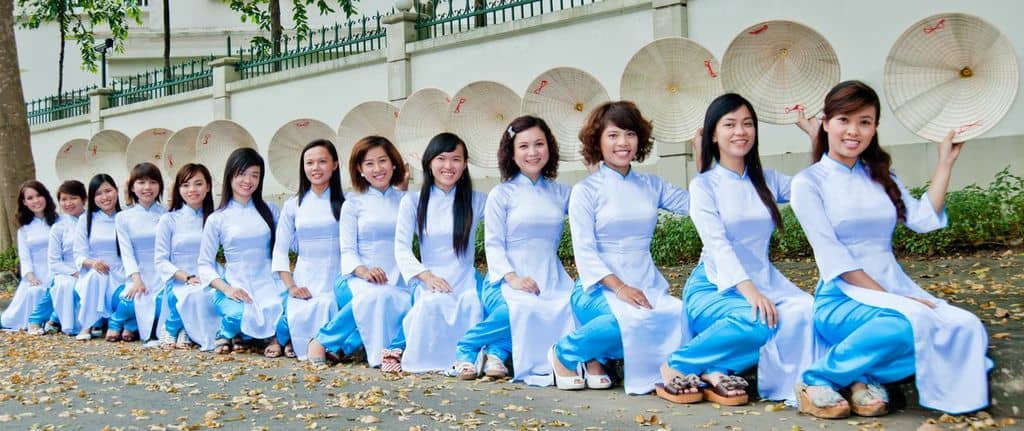
Nothing portrays iconic Vietnamese fashion more than the long flowy dress and the conical hat, otherwise known as the Ao Dai and the Non La. To many, it may just seem like a hat people wear in this part of the world, but the non la is more than just a functional headpiece – it’s a symbol of Vietnamese history, art and culture. But how much do you really know about the conical hat? In fact, many tourists see the hat worn everyday and even buy it as a souvenir, but as we said before, it’s more than just a hat! It’s a cultural symbol that you will see during your Vietnam trip. Let us tell you a bit about what the conical hat truly represents and enrich your cultural knowledge of Vietnam.
It is very easy to find Non La hat around Ho Chi Minh City
A Brief History
The exact origin of the non la is hard to pinpoint but legends and stories dating back thousands of years talk about the conical hat. The hat is depicted as a drawing on two famous ancient relics, the Trong Dong Ngoc Lu (a drum with an intricate pattern carved onto it) and the Thap Dong Dao Thinh (a decorated bronze jar from the Dong Son people). Both these relics are between 2500 to 3000 years old, indicating that the non la is at least that old, if not older. What is for certain is that the hat has been an essential part of Vietnamese culture. Farmers to labourers to ordinary men and women have been using it for utilitarian purposes and will continue to use it for many years to come.
What’s it for?
Vietnam is a sub-tropical country so it gets quite hot – upwards of 40 C in the summer! The hat provides good protection from the sun and heat. During the rainy season, the hat is a good shield for the rain. Farmers often wear it when they are in the sun for extended periods of time. But nowadays, it’s also a fashionable accessory and a great souvenir!
How’s it Made
You may find the design very simple, but the construction is far from it. Remarkably, all the conical hats in the world are hand made! There is no machine dextrous enough to create this work of art. The hat is made from two materials – bamboo and the leaves of palm trees. The frame is made from 16 concentric rings (after much research, 16 has been found to be the magic number!) joined by perpendicular bars of bamboo. The leaves are then sun-dried, ironed very strategically, and then precisely sewn and woven into the frame. The needlework required to make the non la is also very intricate and takes years of experience, not to mention extreme patience and dextrous hands. There are entire villages in the northern part of Vietnam where every person in the village is dedicated to the manufacturing of conical hats!
Regional Variations
As if the construction of the hat wasn’t complicated enough, hat makers have found ways to make it even more intricate. Specific regions have their own way of making the hat unique. For instance, the people from the Lai Chau region make their hats flatter than the regular non la. In our opinion, the most beautiful variation of the non la comes from the Hue region. Hue is the ancient capital of Vietnam and is an incredibly romantic and artistic city. It is the birthplace of many famous Vietnamese poets. So it’s only fitting that there are verses of poetry inserted between the layers of leaves as a sunken design so the words are only visible in sunlight!
Some things you should definitely know…
- The non la is a serious fashion statement on the runways. Designs like Ralph Lauren and Louis Vuitton have used the conical hat in their shows!
Many fashion designers have used the hat in Asian-inspired shows on the runway, and supermodel Kate Moss wore it in a magazine shoot! - The fashion trend has now trickled down to mainstream stores! American Apparel sells the hats (paddy hats, as they call it) for only $15.99. 🙂
Far away from Vietnam, ordinary people have taken up the trend! - If you’re wondering how one would store such a unique shaped hat, you can purchase this beautiful case for it, which just happens to be 10 times the cost of the hat that goes in it!
A beautiful leather hand crafted box to store your palm leaf hat! - Celebrities just love it! Even Lady Gaga has invented a very unique interpretation of the conical hat. 🙂
The one and only Lady Gaga recently wore the ‘non la’ during a public appearance, but of course she put her own spin on it.
This is another fun snapshot of Vietnamese culture brought to you by XO Tours, the most talked about motorbike tour company in the media! Or read more about Shopping in Ho Chi Minh City